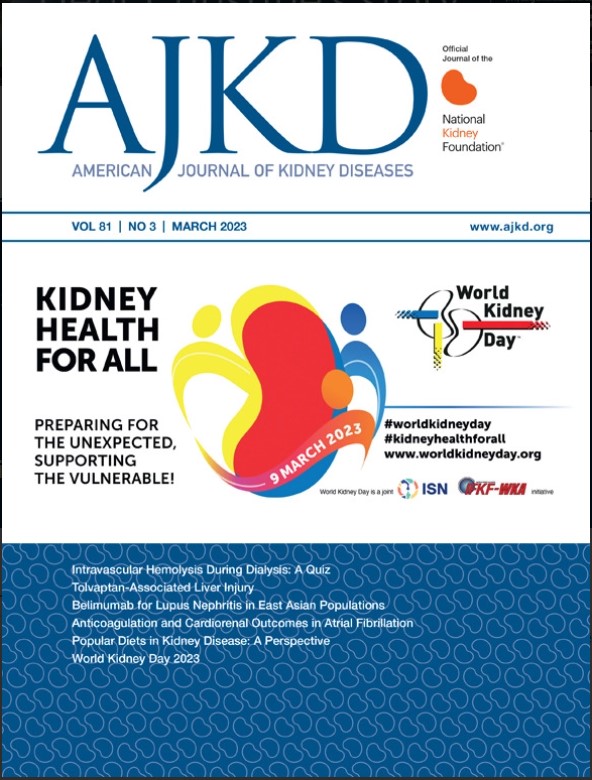老年晚期CKD患者的健康结局偏好和权衡:一项离散选择实验。
IF 8.2
1区 医学
Q1 UROLOGY & NEPHROLOGY
引用次数: 0
摘要
理由与目的:老年人肾衰竭的治疗决策应考虑患者的偏好。本离散选择实验(DCE)旨在确定肾衰竭风险较高的老年慢性肾病(CKD)患者的健康结局偏好。研究设计dce问卷的开发与应用。背景和参与者:65岁及以上的CKD 4期或5期患者在门诊接受治疗。五个调查问卷属性:疲劳、预期寿命、独立程度、住院次数和医院就诊次数。结果:患者的健康结果优先级(属性的相对重要性)和他们愿意做出的权衡(边际替代率)。分析方法:基于定性研究、文献回顾和试点测试的dce设计(n=14)。数据分析采用逻辑回归分析。使用逻辑回归模型探讨年龄子组之间的相互作用。结果85例患者完成问卷调查,平均年龄77岁;65%的男性)。疲劳对患者选择的影响最大(相对重要性为26%),其次是预期寿命(23%)、住院率(20%)、独立水平(16%)和医院就诊率(15%)。为了避免疲劳,患者愿意接受三年生存率降低46%,每年多住院5次,或每年多住院86次。在年龄≥85岁的患者中,避免住院是最重要的健康结果,而在65-74岁的患者中,这是排名最低的属性。限制:要求参与者独立填写问卷。亚组可能太小,无法发现所有显著差异。结论疲劳和预期寿命是老年晚期CKD患者的首要健康结局。避免住院是老年患者的首要任务。这些发现为老年CKD患者在研究和临床实践中选择以患者为中心的结局提供了信息。本文章由计算机程序翻译,如有差异,请以英文原文为准。
Health Outcome Preferences and Trade-Offs Among Older Adults With Advanced CKD: A Discrete Choice Experiment.
RATIONALE & OBJECTIVE
Decision making for the treatment of kidney failure in older adults, should incorporate patient preferences. This discrete choice experiment (DCE) aimed to identify the health outcome preferences of older patients with chronic kidney disease (CKD) who are at elevated risk of kidney failure.
STUDY DESIGN
DCE questionnaire development and application.
SETTING & PARTICIPANTS
Persons aged 65 years and older with CKD stage four or five treated in an outpatient clinic.
EXPOSURE
Five questionnaire attributes: fatigue, life expectancy, level of independence, hospital admissions, and hospital visits.
OUTCOMES
Patients' health outcome priorities (relative importance of attributes) and the tradeoffs they were willing to make (marginal rates of substitution).
ANALYTICAL APPROACH
DCE design based on qualitative research, literature review, and pilot testing (n=14). Data were analyzed using a logistic regression analysis. Interactions between age subgroups were explored using logistic regression models.
RESULTS
85 patients completed the questionnaire (mean age 77 years; 65% male). Fatigue had the greatest influence on patients' choices (relative importance 26%), followed by life expectancy (23%), hospital admissions (20%), level of independence (16%), and hospital visits (15%). To avoid fatigue, patients were willing to accept a 46% decrease in three-year survival probability, five extra hospital admissions per year, or 86 extra hospital visits per year. Among patients aged ≥85 years, avoiding hospital admissions was the top health outcome priority, while among patients aged 65-74 years, it was the lowest-ranked attribute.
LIMITATIONS
Participants were required to return the questionnaire independently. Subgroups may have been too small to detect all significant differences.
CONCLUSIONS
Fatigue and life expectancy were the top health outcome priorities of older people with advanced CKD. Avoiding hospital admissions was the top priority among the oldest patients. These findings inform the choice of patient-centered outcomes in research and clinical practice for older patients with CKD.
求助全文
通过发布文献求助,成功后即可免费获取论文全文。
去求助
来源期刊

American Journal of Kidney Diseases
医学-泌尿学与肾脏学
CiteScore
20.40
自引率
2.30%
发文量
732
审稿时长
3-8 weeks
期刊介绍:
The American Journal of Kidney Diseases (AJKD), the National Kidney Foundation's official journal, is globally recognized for its leadership in clinical nephrology content. Monthly, AJKD publishes original investigations on kidney diseases, hypertension, dialysis therapies, and kidney transplantation. Rigorous peer-review, statistical scrutiny, and a structured format characterize the publication process. Each issue includes case reports unveiling new diseases and potential therapeutic strategies.
 求助内容:
求助内容: 应助结果提醒方式:
应助结果提醒方式:


